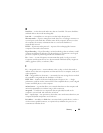
224 Glossary
modem — A device that allows your computer to communicate with other computers
over analog telephone lines. Three types of modems include: external, PC Card, and
internal. You typically use your modem to connect to the Internet and exchange
e-mail.
module bay — See media bay.
MP — megapixel — A measure of image resolution used for digital cameras.
ms — millisecond — A measure of time that equals one thousandth of a second.
Access times of storage devices are often measured in ms.
N
network adapter — A chip that provides network capabilities. A computer may
include a network adapter on its system board, or it may contain a PC Card with an
adapter on it. A network adapter is also referred to as a NIC (network interface
controller).
NIC — See network adapter.
notification area — The section of the Windows taskbar that contains icons for
providing quick access to programs and computer functions, such as the clock, volume
control, and print status. Also referred to as system tray.
ns — nanosecond — A measure of time that equals one billionth of a second.
NVRAM — nonvolatile random access memory — A type of memory that stores data
when the computer is turned off or loses its external power source. NVRAM is used for
maintaining computer configuration information such as date, time, and other system
setup options that you can set.
O
optical drive — A drive that uses optical technology to read or write data from CDs,
DVDs, or DVD+RWs. Example of optical drives include CD drives, DVD drives,
CD-RW drives, and CD-RW/DVD combo drives.
P
parallel connector — An I/O port often used to connect a parallel printer to your
computer. Also referred to as an LPT port.
partition — A physical storage area on a hard drive that is assigned to one or more
logical storage areas known as logical drives. Each partition can contain multiple
logical drives.


















